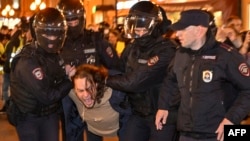A U.N. human rights expert says repression against dissidents and civil and political rights in the Russian Federation has reached unprecedented levels since the country’s invasion of Ukraine.
In her first report as Special Rapporteur of human rights in Russia, Mariana Katzarova told the United Nations Human Rights Council that Moscow’s full-scale invasion of Ukraine “has been followed by a rapid deterioration of the human rights situation.”
She said the incremental and calculated restrictions on human rights in Russia over the past two decades “have culminated in the current state policy of criminalizing any actual or perceived dissent and bolstering support for the war” through censorship, state sponsorship propaganda, and state-controlled information sources.
During an interactive dialogue at the Council Thursday and Friday, Katzarova told delegates that Russian authorities had attempted to obstruct her work by denying her access to their territory and preventing her from meeting various stakeholders, including government officials, victims of human rights violations, civil society, and law enforcement.
“But this did not stop me from receiving information from almost 200 sources both within and outside Russia,” she said.
Between the start of the war in Ukraine and June of this year, she said over 20,000 people have been detained for participating in largely peaceful anti-war protests and more than 600 criminal lawsuits have been initiated against so-called “anti-war activity.”
“I have received credible reports of torture and ill-treatment against protesters, including allegations of rape and other sexual violence, committed by law enforcement officials against both women and men in detention,” she said.
Katzarova also said there has been a surge in politically motivated prosecutions, with over 500 new cases last year alone, noting that at least 82 such cases were initiated in the first seven months of this year.
“The indictment of Wall Street Journal reporter, Evan Gershkovich, on charges of espionage, highlights the recent use of such charges against investigative journalists and people with no access to state secrets,” she said.
Speaking to journalists in Geneva, Katzarova said Gershkovich’s case and those of political figures such as Alexei Navalny, journalist Vladimir Kara-Murza, and Russian opposition politicians Ilya Yashin and Alexey Gorinov, highlight the importance of her mandate as a bridge to the Russian people.
She said she considered her mandate to be “a voice for the people of the Russian Federation … for the victims of civil society, for those who dare to speak out against the war in Ukraine and get really punished for that.”
She said she was prepared to listen to anybody in the Russian Federation and “to receive their submissions or their complaints or their grievances and bring them back to the Russian authorities and the international community.”
Katzarova called on the international community to continue to seek engagement with Russian authorities to secure the immediate release of all political prisoners and to put in place comprehensive policies to protect and enable the vital work of human rights defenders.
Russia boycotted the meeting. Most of the delegates participating in the discussion following the rapporteur’s presentation expressed concern about the worsening human rights situation in Russia.
They condemned crackdowns on opponents of the war in Ukraine. They lambasted Russia’s restrictions on civil society, and the silencing of journalists and human rights defenders who have spoken out against the war.
Several countries criticized Russia’s oppressive treatment of various minorities. They deplored recent attacks against LGBTQI persons and the denial of the rights of these groups.
While Russia chose not to confront its detractors, some allied countries came to its defense. Syria, for example, expressed full support for Russia’s position, calling the Rapporteur’s report “baseless, subjective, and full of misleading and baseless allegations.” It said the council should immediately end this destructive approach and states should stop interfering in Russia’s sovereign affairs.
The representative from Nicaragua rejected what she called the manipulation by the Special Rapporteur on Russia. She said the mandate was promoted by Western States who aim to destabilize Russia.
Cuba rejected the report as a selective politicized exercise against a specific country under the guise of human rights and without the consent of the concerned country.






